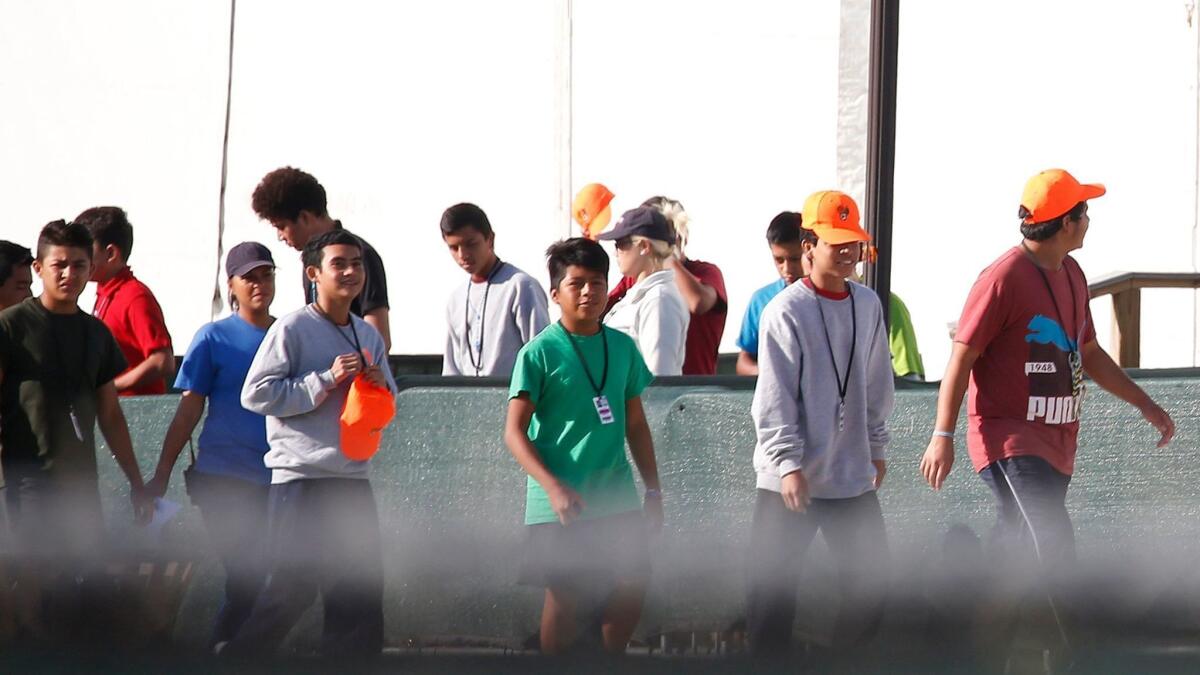Opinion: Trump’s heavy-handed immigration policies have a clear set of victims: Children

- Share via
Trump’s heavy-handed immigration enforcement policies have a clearly discernible set of victims: Children.
After hearing complaints about squalid conditions and lengthy detentions of minors, U.S. District Court Judge Dolly M. Gee last week gave the government a July 12 deadline to work with a court-appointed mediator and the plaintiffs suing on behalf of the children to “file a joint status report regarding their mediation efforts and what has been done to address post haste the conditions.”
The government had asked in vain for more time, with Gee pointedly noting that the government has failed to meet previous court orders regarding detention conditions for minors. The 1997 Flores agreement limits detention of children at border stations to 72 hours and in detention centers to 20 days in the least-restrictive conditions possible, which the government routinely breaks.
“The Court has already issued several orders that have set forth in detail what it considers to be violations of the Flores Agreement,” Gee wrote. “The parties need not use divining tools to extrapolate from those orders what does or does not constitute noncompliance.”
Do you feel safer knowing our government treats children this way?
Yet lawyers who toured one center in Texas recently reported finding children in soiled clothes and diapers, and without ready access to showers, soap, toothbrushes and toothpaste and other personal items.
The government blames the influx of migrants from Central America, arguing that the sheer numbers have overwhelmed its system. President Trump and Vice President Mike Pence have blamed Congress for lack of funding, and there’s some truth to that. Congress has failed to create and finance a system to quickly process the children it takes into custody and find sufficient caregivers for them.
But there’s more at play here than underfunded facilities. Revelations of a private Facebook group of 9,500 border agents, which contained racist and misogynist posts including some targeting sitting members of Congress, illustrate what is at least a subculture among border agents of abject disdain not only for migrants, but for political figures seeking to help them.
Enter the Fray: First takes on the news of the minute »
Getting housed in squalid conditions is only part of the mistreatment of minors. A report by the American Civil Liberties Union last year detailed incidents of physical abuse of minors at the hands of border agents during the Obama administration. And the government is still separating children from their immigrant parents despite court orders barring that atrocious practice.
Children who arrive at the border, either alone or with relatives, are in most cases fleeing deep poverty and violence. That doesn’t mean that they qualify for protection and asylum status here, but they do have the lawful right to ask for sanctuary.
And here children face another hurdle (as do adult migrants). Because immigration is a civil matter, children facing deportation are not entitled to a lawyer. If they can find one, they can use one, but unlike in criminal courts, the government is under no obligation to provide one.
So we have the absurdist spectacle of children squaring off against government lawyers before immigration judges and trying to explain under which part of immigration and asylum law they are petitioning for permission to remain in the U.S.
The presence of a lawyer makes a crucial difference. About 3 of 4 minors who are aided in court by a lawyer win the right to remain in the country, while more than 80% without a lawyer get deported, according to past analyses by the Transactional Records Access Clearinghouse at Syracuse University.
Meanwhile, as the government ratchets up its interior enforcement, some 4 million U.S.-born children — citizens — face the possibility that their parents will get arrested and deported, forcing families to decide whether to send these American children abroad, as well, or leave them to be raised by extended family members or friends.
All done, of course, in the pursuit of national security and secure borders. Do you feel safer knowing our government treats children this way?
More to Read
A cure for the common opinion
Get thought-provoking perspectives with our weekly newsletter.
You may occasionally receive promotional content from the Los Angeles Times.











